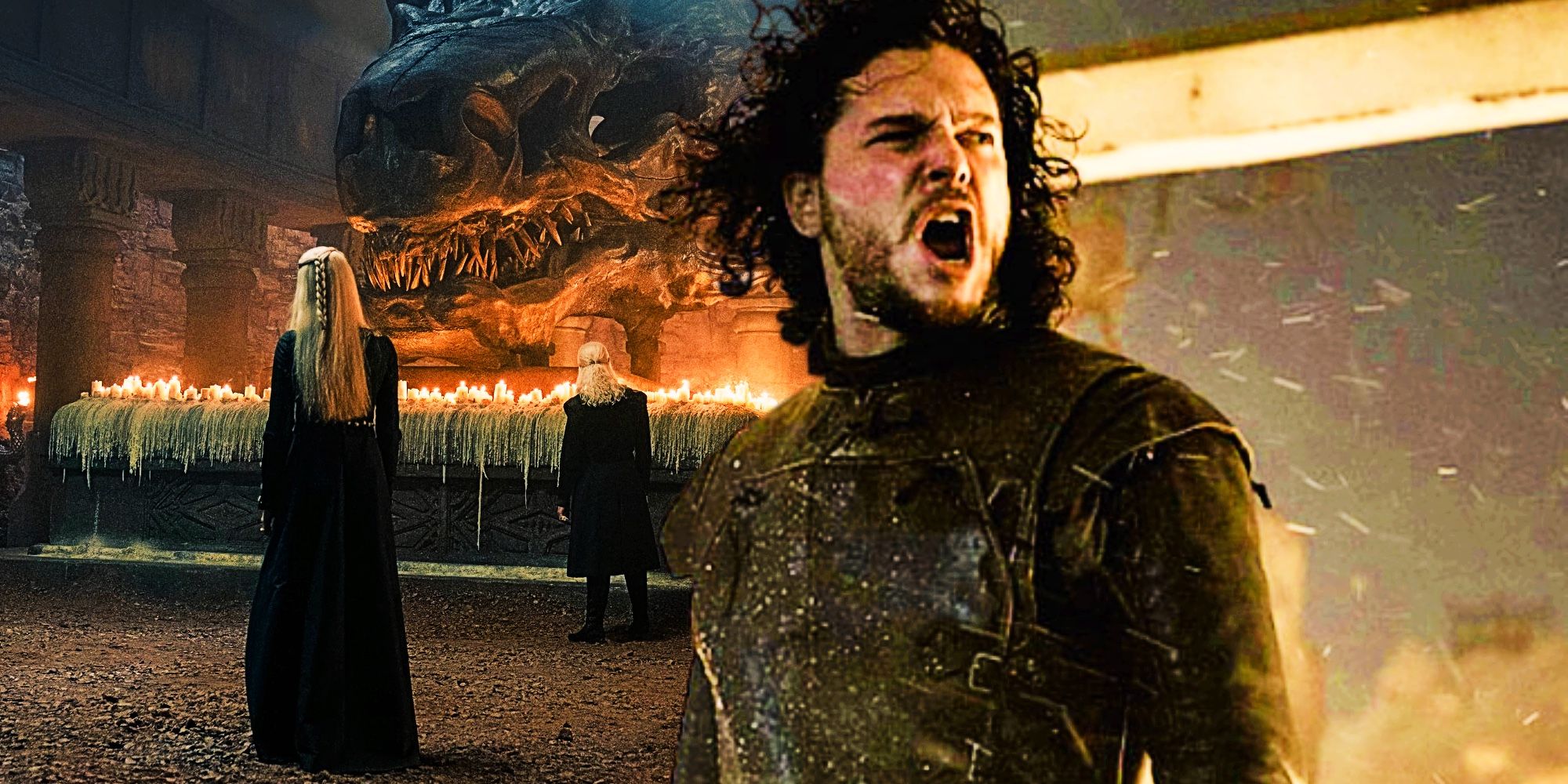WARNING! This article contains SPOILERS for House of the Dragon season 1, episode 4!House of the Dragon episode 4’s new reveal from Aegon’s prophecy changes the destiny of Jon Snow’s Game of Thrones story yet again. Jon Snow’s major story arc in Game of Thrones saw him banding together the realm against the threat of the White Walkers, which culminated in an alliance and romance with Queen Daenerys Targaryen. The original series then confirmed a major twist to his journey that had long been speculated: Jon Snow was the trueborn son of Lyanna Stark and Rhaegar Targaryen, making him Aegon Targaryen, the rightful heir to the Iron Throne. While Game of Thrones’ ending had seemingly made his Targaryen heritage irrelevant, House of the Dragon’s focus on prophecy has given his story a new meaning entirely.
The first change to Jon’s narrative in Game of Thrones was revealed in House of the Dragon’s premiere, which explained the prophecy of Aegon the Conqueror’s Song of Ice and Fire dream. In his vision, Aegon saw a devastating winter and darkness that would bring an end to humanity. Salvation would only be possible if a Targaryen king or queen sat on the Iron Throne, with the strength to unite the realm against the threat. The context of Game of Thrones’ ending confirmed that the prophesied Targaryens to save the living from the White Walkers were both Jon Snow and Daenerys Targaryen, proving the former character’s heritage was always a crucial part of his development. House of the Dragon episode 4 has now introduced another layer to Aegon’s prophecy, which gives more power to Jon Snow’s role in the franchise’s larger story.
In House of the Dragon episode 4, King Viserys shows Rhaenyra that Aegon’s dream was secretly inscribed on the Targaryens’ Valyrian steel dagger, which reads, “From my blood come the prince that was promised, and his will be the song of ice and fire.” This confirms that Aegon’s vision is the same as the Prince That Was Promised prophecy preached by Melisandre in Game of Thrones, giving more weight to the notion that Jon Snow was the savior who should have killed the Night King. Game of Thrones’ ending left the identity of the Prince That Was Promised slightly ambiguous due to Daenerys’ death, Jon losing his titles, and Arya wielding the weapon to destroy the White Walkers, but the prophecy’s connection to Aegon’s dream seems to finally confirm which character fulfilled the vision.
Was Jon Snow The Prince That Was Promised?
Aegon’s dream foreseeing a Targaryen as the Prince That Was Promised – with such a character’s journey being the song of ice and fire – gives more weight to Jon Snow being the prophesied savior than Daenerys. While Daenerys was certainly part of Melisandre's preached prophecy and shares the title, Jon fulfilled the vision in more aspects. For one, his was the song of ice and fire; Jon is the union of House Targaryen (fire) and House Stark (ice), whose entire mission above all else in Game of Thrones was to defeat the Night King and White Walkers. Still, Daenerys fits the prophecy by bringing back the dragons, earning the title of Queen of Westeros (albeit briefly), and obtaining the necessary support from various noble houses before the Battle of Winterfell.
Without Daenerys, Jon couldn’t have defeated the White Walkers, but without Jon, the unified fight against them would never have begun. Although he didn’t wield the Valyrian steel dagger to take down the Night King, Jon was the Prince That Was Promised who prioritized saving humanity over his own ambition. It’s unclear whether Arya specifically killing the Night King will be integrated into Aegon’s prophecy, but as it stands in House of the Dragon, Jon was the envisioned Targaryen warrior needed to battle the army of the dead in the greatest duel between ice and fire.
Jon's Game Of Thrones Ending Continues His Fulfillment Of Aegon's Prophecy
While failing to sit on the Iron Throne seemed to be throwing away the purpose of his Targaryen ancestry, Jon heading North in Game of Thrones’ ending is actually a more apt continuation of Aegon’s dream. Aegon only foresaw the need for the Targaryens to hold the Iron Throne until the great winter came, with their purpose being fulfilled after destroying the White Walkers. The Targaryens thus no longer had a birthright to the Iron Throne upon the Night King’s death, leaving Jon’s future somewhat unwritten thereafter.
However, by going to the Night’s Watch and traveling beyond the Wall after Game of Thrones, Jon continues upholding his role as the Prince That Was Promised by defending the living from the dark and cold. It’s unknown exactly what still lurks deep in the North or whether the White Walkers could ever rise again, so Jon rejoining the Night’s Watch maintains him as the “fire that burns against the cold, the light that brings the dawn, the horn that wakes the sleepers, and the shield that guards the realms of men.”
What Jon didn’t know when he first said these words as a man of the Night’s Watch was that it had always been his destiny; Jon was the fire that burned against the cold White Walkers in Game of Thrones, and he’ll continue to be the shield against the dangers that lie in the North. House of the Dragon reveals that the Targaryen legacy in Westeros was always bigger than the Iron Throne, so as Aegon’s prophesied Prince That Was Promised, Jon’s ultimate purpose is to keep protecting the living rather than play the proverbial game of thrones.
New episodes of House of the Dragon release Sundays on HBO/HBO Max.



